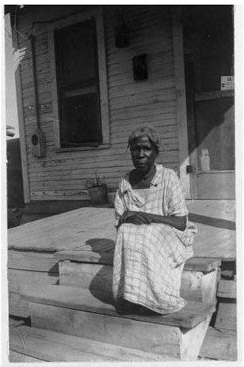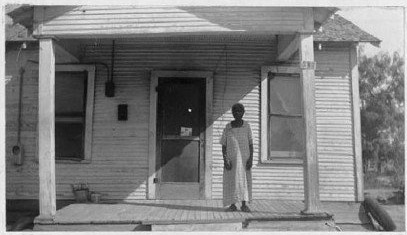Peggy, Does You Love Me Now?
This is a song the slaves sang. Jenny Proctor, an ex-slave, told an interviewer in the 1930's that "Peggy Does You Love Me Now" was sung when going to the cotton patch. The slaves she knew picked cotton for their own use early in the morning before starting work for the slaveholder.
Below is what Jenny wrote about the song. [I put Jenny's additional explanations in brackets in the middle of the song.]
"We had some co'n shuckin's sometimes but de white folks gits de fun and de ni-er gits de work. We didn' have no kind of cotton pickin's 'cept jes' pick our own cotton. I's can hear dem darkies now, goin' to de cotton patch way 'fore day a singin'…

Peggy, Does You Love Me Now?
Peggy, Do You Love Me Now?
Work Song
Work Song
(Historical Black American English)
(English)
"Peggy, does you love me now?"
["One ole man he sing…"]
"Sat'day night and Sunday too
Young gals on my mind,
Monday mornin' way 'fore day
Ole marster got me gwine."
Chorus:
Peggy, does you love me now?'
["Den he whoops a sort of ni-er holler, what nobody can do jes' like dem ole time darkies, den on he goes…"]
Possum up a 'simmon tree,
Rabbit on de ground
Lawd, Lawd, 'possum,
Shake dem 'simmons down.
Peggy, does you love me now?
Holler
Rabbit up a gum stump
'Possum up a holler
Git him out little boy
And I gives you half a dollar.
Peggy, does you love me now?
"Peggy, do you love me now?"
["One old man sang…"]
Saturday night and Sunday too
Young girls on my mind,
Monday morning way before day
Old master got me going.
Chorus:
Peggy, do you love me now?
["Then he whoops a sort of ni-er* holler, that nobody can do just like them old time darkies, then on he goes…"]
Opossum up a persimmon tree,
Rabbit on the ground
Lord, Lord, opossum,
Shake those persimmons down.
Peggy, do you love me now?
Holler
Rabbit up a gum-tree** stump
Opossum up in a holler***
Get him out little boy
And I'll give you half a dollar.
Peggy, do you love me now?'
Notes
*I wrote it as "ni-er" to not offend anyone.
**I added tree because I believe it's referring to a gum tree stump. If anyone knows otherwise, please let me know.
***I added "in" here because I believe it means the opossum went up in a holler meaning quickly!

Thanks and Acknowledgements
This song was written down in the Work Projects Administration's Slave Narratives. The government sent out interviewers to talk with the ex-slaves and write down what they had to say. This song is from an interview of Jenny Proctor.
Note about Jenny Proctor from the WPA files: "Jenny Proctor was born in Alabama in 1850. She was a slave of the Proctor family and began her duties about the house when a very young girl. As soon as she was considered old enough to do field labor she was driven with the other slaves from early morning until late at night. The driver was cruel and administered severe beatings at the slightest provocations. Jenny remained with her owners after the close of the Civil War, not from choice but because they had been kept in such dense ignorance they had no knowledge of how to make their own living. After the death of her master several years later, she and her husband, John Proctor, came to Texas in a mule drawn covered wagon and settled in Leon County near the old town of Buffalo. There they worked as sharecroppers until the death of her husband. She then came to San Angelo, Texas with her son, with whom she has made her home for many years."
Photos are of Jenny Proctor by the WPA.

























